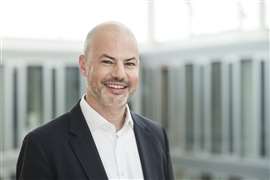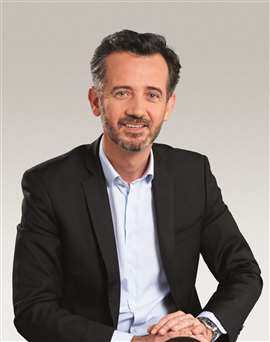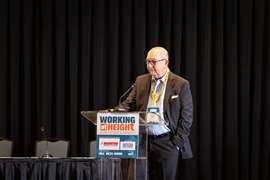Top 10 quotes shaping the equipment rental sector in 2024
18 December 2024
 Arne Severin, vice president of the ERA.
Arne Severin, vice president of the ERA.
As the equipment rental industry faces numerous challenges, from the shift towards sustainability to the consolidation of market players, many of the leading voices in the industry shed light on the strategies driving success and innovation.
What follows could offer a glimpse into the future, insight into the present, or maybe even best practice advise for rental operations....
“We as an industry can deliver significant value to customers and communities” - Arne Severin, vice president of the ERA
For a long time, the equipment rental industry and wider construction sector have both grappled with the significant challenge that is the energy transition.
How do companies offer customers electric units while also keeping rental rates at a good level? Could a collaborative approach hold the key to really drive adoption in the industries?
Some of these questions were the focus during European Rental Week, where sustainability formed one of three key pillars that the organisers, the European Rental Association (ERA), aimed to shine a light on.
In his opening speech, Arne Severin, vice president of the ERA, said the event emphasises the industry’s efforts to reduce carbon footprints, promote energy efficiency and minimise waste. Severin said, “By integrating eco-friendly equipment and renewable energy solutions, we as an industry can deliver significant value to customers and communities.”
“For companies with budgets large or small, reducing jobsite emissions is possible now” - Grant Zoldowski, director of environmental management, United Rentals
Staying with the sustainability theme, the initial cost of electric equipment is often a barrier to those companies that want to take the leap, but is there more to that than meets the eye?
That was one of the key findings of a white paper on sustainability published by United Rentals, which stated that the higher upfront expense of electric equipment is “partially offset by lower operating costs and significantly reduced maintenance needs.”
Grant Zoldowski, director of environmental management, United Rentals, said, “For companies with budgets large or small, reducing jobsite emissions is possible now. A smart jobsite sustainability strategy starts with data.
“Targeting the predominant sources of emissions on projects and jobsites allows companies to focus their efforts and dollars on changes that will yield the biggest results. This approach provides the foundation for more sustainable power generation, battery storage and electric equipment options.”
“Consolidation of the equipment rental industry has been going on for decades” - Mike Disser, RMC Consults LLC
 Mike Disser has joined Michael Crouch at RMC Consults.
Mike Disser has joined Michael Crouch at RMC Consults.
On the face of it, consolidation has been the name of the game for the equipment rental industry in 2024, with the likes of United Rentals, Herc, Sunbelt and Boels all familiar with big acquisitions.
While in the past some of this consolidation could have been viewed as fragmented or a ‘shotgun approach’, recent years seem to have highlighted a more streamlined approach to deals.
Speaking to IRN in March, Mike Disser of RMC Consults LLC said some of the big hitters are going down this path.
He said, “Consolidation of the equipment rental industry has been going on for decades, now with transactions happening on a monthly basis. For the strategics, like United Rentals, Sunbelt Rentals, HERC Rentals and others, there has been a distinct shift from geographic acquisitions to a more strategic one, such as specialty rental businesses, to augment their current offerings.
“They have most geographic areas covered, so now their sights are set on new businesses. I believe this trend will continue as new rental business opportunities are realized. Recent acquisitions of a construction matting company or movie production lighting and grips are examples of these new rental businesses. I recently read where we might actually be renting our clothes in the future. The rental industry is the original sharing economy and we are only limited by our own perceptions and complacencies about what is possible.
“It has been a little different for private equity firms who have been acquiring rental businesses in order to consolidate and re-engineer in order to improve their return on investment. With interest rates moving higher, it has become a little more difficult to achieve their ROI goals. However, there are record amounts of money on the side lines waiting for the right investments.
“PE firms must look beyond their traditional financial engineering levers of add-ons, financial management, financial leverage, and operational cost control. Instead, they need to lean into and improve their operations and systems to drive organic revenue growth.
“Bottom line: Consolidation is here to stay.”
“To be top five I think we need to be in the North American market” - Tetsuo Kanamoto, president of Kanamoto
If the annual IRN100 ranking of equipment rental companies based on revenues revealed anything, it was that the North American market is still a huge market of opportunity, with the top 15 companies there generating 45% of the final total.
With that, it should come as no surprise that the eyes of companies from overseas will inevitably look towards North America for growth opportunities.
That is the case for Japan-based Kanamoto, with its president Tetsuo Kanamoto telling IRN in an interview earlier this year that the company is open to a move there.
He told IRN, “To be top five I think we need to be in the North American market, which is very attractive. We’ve already begun a feasibility study to look into that and we’re looking into the US in depth.”
“We can’t say right now if we are interested in any particular region, but we’re taking a deep dive into the market.”
He says the company is taking a cautious approach, highlighting the unpredictability of US politics and exchange rates making it “not an ideal time to go shopping.”
“1/3 of the motorised fleet we are going to buy will be low carbon” - Olivier Colleau, executive chairman, Kiloutou
 Olivier Colleau, executive chairman, Kiloutou
Olivier Colleau, executive chairman, Kiloutou
One of the companies that have invested significantly in electric equipment is France-based Kiloutou, which is looking at both its internal and external fleet when considering alternative-powered units.
In July this year, Olivier Colleau, executive chairman, Kiloutou, said the company is aiming to invest roughly 1/3 of its investment in 2024 on low carbon units.
He said, “It’s quite a big amount and this will include electric equipment, while we are starting to buy some hydrogen units for generators. We are also doing some actions for our own resources in terms of delivery trucks. We were the first company I think in Europe to buy 32 tons electric trucks, which is the big thing to deliver to our customers.
“Lastly, we try as far as we can to contribute to the overall actions of the ecosystem. We cannot act alone so we decided to create a community of the entire value chain, including manufacturers, rental companies and construction companies (denominated “Sustainable Fleet Community,” “Communauté des Acteurs du Matériel Durable” in French).”
“The new strategic direction has been underpinned by our commitment to sustainable innovation” - Graham Nixon, CEO, Nixon Hire
There has been a notable shift in the number of rental companies that are going down the specialty path. However, most of these are additions to there existing offering.
One company that made the decision to become a “specialist supplier of sustainable equipment” was UK-based Nixon Hire, which sold off its fleet of plant in favour of focusing on portable accommodation and renewable power, alongside site welfare and portable toilets.
It was a hard decision to make according to CEO Graham Nixon, but the right one. He told IRN earlier this year, “The new strategic direction has been underpinned by our commitment to sustainable innovation in itself.
“We’re supplying site accommodation and modular buildings that need power, we could have easily just bought a generator company or put diesel generators out on our hire fleet but that’s evolving and changing.
“We wanted to go in there and say ‘no’, we are going solar products, hybrid generators, and our renewable power offering is all about that we don’t have a hire fleet of diesel generators, everything’s got either solar attached to it. We do solar toilets and solar welfare cabins. We are changing as fast as technology changes. We’re investing heavily into that sector.”
“Taking calculated risks is a fundamental component of running and growing a successful business” Andy Wright, executive chair of Vital Power Group
There has been a growing acceptance in business that taking calculated risks is essential for growth and success. IRN columnist Andy Wright, executive chair of Vital Power Group, summed this up earlier this year by referencing Soichiro Honda, the founder of the Japanese motor giant, who famously said, “Success is 99% failure.”
“The point is well made, taking calculated risks is a fundamental component of running and growing a successful business and people will only take these risks if they feel that they are safe when doing so.
“Things going wrong or ‘failing’ are all opportunities to learn, change and improve ourselves or our organisation and calculated risk taking should be positively encouraged.
“I’ve always believed in this approach and have led or been part of a number of teams where this approach has been adopted and I’ve seen it deliver great results. It creates a dynamic, stimulating, and motivating experience for members of the team that is self-fulling and allows the business to grow rapidly.
“The key, however, is to ‘fail fast’ and not leave ideas and decisions that are clearly not working to fester, create a negative impact on the broader business and die a lingering death. If it’s not working then accept it’s not working, close it down and start all over again.
“This, in my mind, is what Mr Honda meant when he said that ‘success is 99% failure’.”
“As the rental industry has consolidated, specialty has gained more visibility” - David C. Scott, senior vice president – specialty division, United Rentals.
Specialty has always played a role in the rental industry, often led by independent companies. However, as the market has evolved, specialty has gained increased visibility, particularly as the rental industry continues to consolidate.
David C. Scott, senior vice president of the specialty division at United Rentals, noted that while specialty has become more prominent, both specialty and generalist rental companies have seen substantial growth opportunities; “Specialty has always played a part in the rental industry and for years was dominated by independents.
“As the rental industry has consolidated, specialty has gained more visibility in the marketplace, but generally, specialty and generalist have both experienced great opportunity for growth as the rental markets have matured and experienced the transformational shift from ownership to rental.”
“It is slowing down, but we think it’s going to be a soft landing” - John W McClelland, vice president of Government Affairs and chief economist at the ARA
 John W McClelland, Vice President of Government Affairs and Chief Economist at the ARA.
John W McClelland, Vice President of Government Affairs and Chief Economist at the ARA.
As the rental market experiences a slowdown, there’s still an air of optimism about what lies ahead. John W. McClelland, vice president of Government Affairs and chief economist at the American Rental Association (ARA), offered a cautious yet hopeful outlook. “
The story is that it is slowing down, but we think it’s going to be a soft landing,” he said.
McClelland’s comments, made at the inaugural Working at Height Conference event, suggest that while the market is facing challenges, it is unlikely to dip into negative territory.
Instead, the expectation is for a gradual adjustment, allowing businesses to weather the changes with resilience. This perspective aligns with broader forecasts in the industry, which anticipate a transition rather than a sharp downturn.
For more details, McClelland’s full comments can be found in the article from Access Briefing here.
“The search for margins is driving the overseas diversification” - Jimmy Wang, founder and CEO of China Construction Bright Future (CCBF)
The quest for improved margins is increasingly shaping the strategy of companies in the global rental market. Jimmy Wang, founder and CEO of China Construction Bright Future (CCBF), shared his perspective on this shift: “The search for margins is driving the overseas diversification.”
Wang’s comment highlights a key trend observed at Bauma China and the International Rental Conference (IRC)—companies are seeking growth and profitability through expansion beyond their home markets. By diversifying internationally, these companies aim to tap into new revenue streams and gain a competitive edge in a maturing industry.
For more insights, Wang’s full remarks can be found here.
STAY CONNECTED



Receive the information you need when you need it through our world-leading magazines, newsletters and daily briefings.
CONNECT WITH THE TEAM







